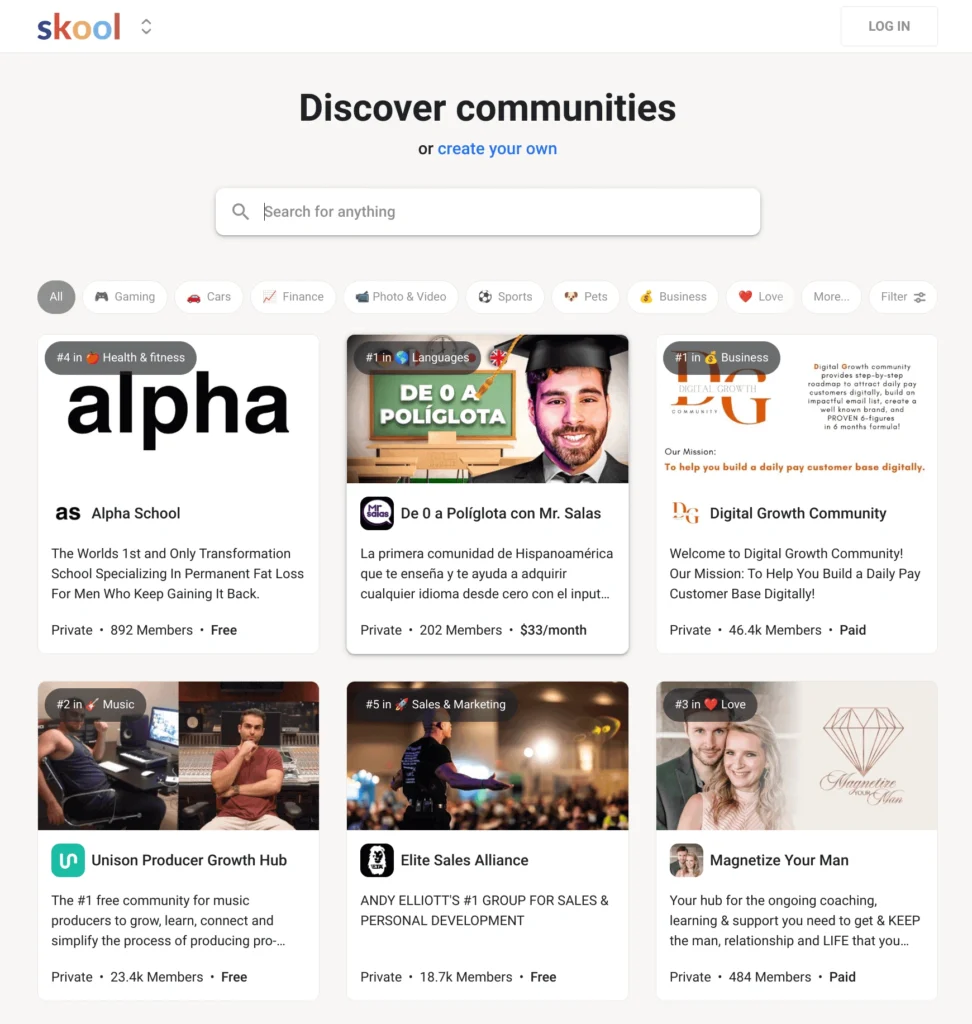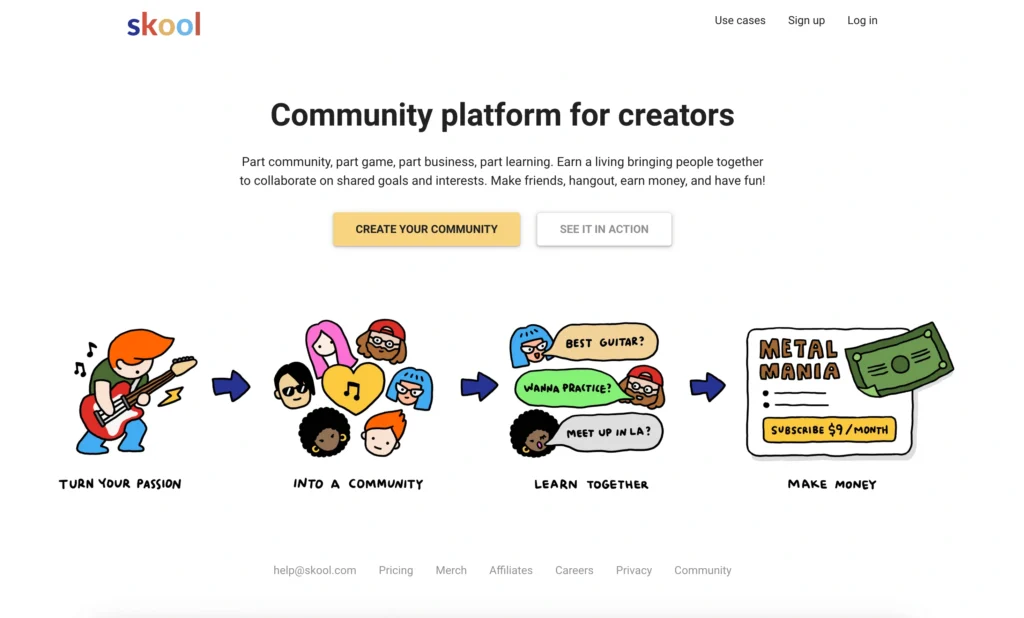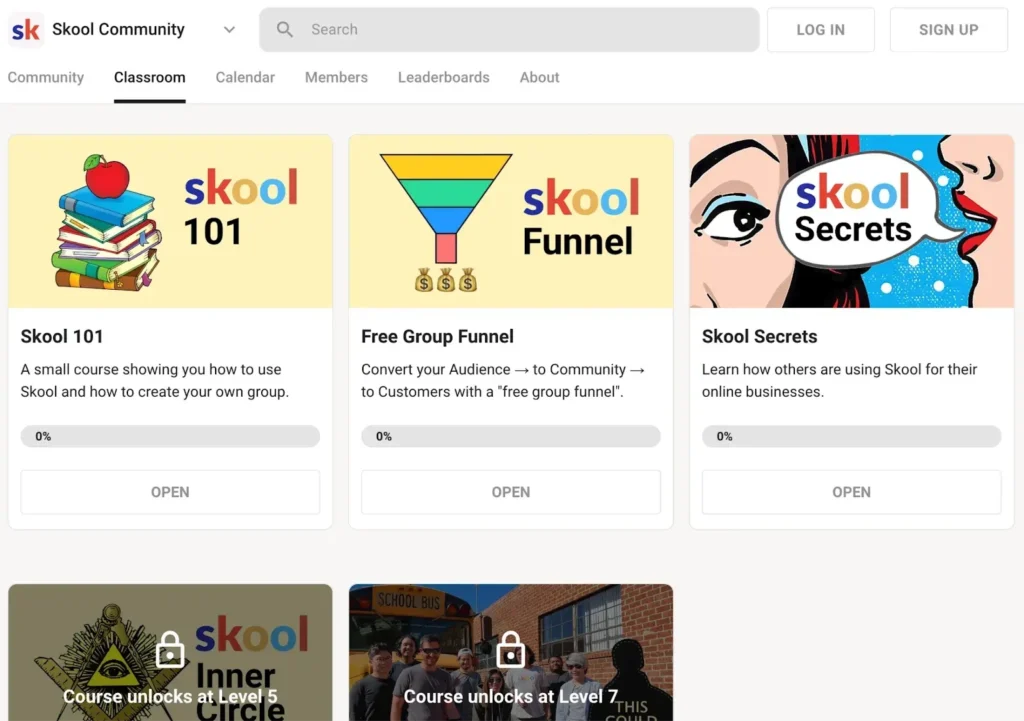Table of Contents
Introduction
Skool Review: In a digital world crowded with disjointed tools for learning, coaching, and community-building, Skool emerges as a game-changer. Designed to merge community engagement, course delivery, and event coordination under one roof, Skool offers an elegant alternative to platforms like Kajabi, Thinkific, or Circle.
If you’re a course creator, coach, or community builder seeking a more intuitive, gamified, and unified experience for your members, this Skool Review is for you. We dive deep into Skool’s features, pricing, pros and cons, and what makes it stand out in the crowded digital product space.
Product Overview

What Is Skool?
Skool is an all-in-one online platform that combines community features, course management, and event scheduling into a single interface. Unlike traditional LMS or community tools, Skool prioritizes user engagement through gamification and clean UX.
Creator/Company:
Skool was developed by entrepreneur Sam Ovens and has recently gained more traction with the involvement of Alex Hormozi. It’s designed to make online communities more engaging, organized, and monetizable.
Primary Purpose:
Skool solves the problem of fragmented online experiences by offering a centralized platform where educators, coaches, and creators can host their content, connect with members, and run events.
Pricing Information:
- Flat Rate: $99/month per group
- Free Trial: 14 days
- No limits: Unlimited members, courses, and events
- Payment structure: Monthly subscription only (Stripe integration)
Access Details:
Skool can be accessed directly at www.skool.com where you can start your free trial.
Key Features

Community Tab
- Functions like a Facebook group but with no ads, distractions, or algorithms.
- Supports posts, comments, likes, GIFs, and polls.
- SEO-optimized posts that can rank in search engines.
Classroom
- Organize content into courses → sets → modules.
- Modules support videos (YouTube, Vimeo, Loom), files, transcripts.
- Simple and intuitive content navigation.
Calendar
- Schedule live events (e.g., coaching calls, webinars).
- Auto time-zone adjustment and integrated reminders.
- Syncs with Zoom and other third-party platforms.
Gamification & Leaderboards
- Members earn points through engagement.
- Admins can unlock content based on levels.
- Badges, levels, and leaderboards create a sticky, addictive environment.
Members Directory
- Profiles show bios, stats, and engagement level.
- Encourages peer-to-peer networking.
Monetization Tools
- Built-in Stripe payments with 2.9% + $0.30 fee per transaction.
- Only supports monthly billing (no one-time or annual options yet).
- Can create private, paid-access groups.
Mobile App
- Full-featured mobile experience with push notifications.
Affiliate Program
- Offers 40% recurring commission to affiliates promoting Skool.
User Experience
Learning Curve:
- Minimal. Most users find Skool intuitive and easy to navigate.
Interface:
- Clean, clutter-free dashboard.
- Mobile and desktop optimized.
Onboarding:
- Quick setup with simple group configuration.
- Excellent first-time user experience.
Technical Knowledge Needed:
- Virtually none. Everything is designed for non-tech-savvy users.
Support Options:
- Active online help center and documentation.
- Support ticket system.
- Vibrant user community for peer help.
Pros and Cons
Pros:
- All-in-one solution: no need for separate platforms.
- SEO-optimized posts and user engagement features.
- Flat pricing with no member limits.
- Game-like experience boosts retention.
- Excellent affiliate program.
Cons:
- No built-in video hosting or quizzes.
- Limited to monthly recurring payments.
- One group per $99 subscription.
- Lacks funnel-building or advanced marketing tools.
Comparison with Alternatives
| Feature | Skool | Kajabi | Thinkific + Circle |
|---|---|---|---|
| Community + Courses | ✔ | ✔ | Partial |
| Gamification | ✔ | ✖ | ✖ |
| Pricing Simplicity | ✔ | ✖ (Tiered) | ✖ (Separate fees) |
| Funnels & Email | ✖ | ✔ | ✖ |
When to Choose Skool:
- You want simple, all-in-one access with a vibrant, engaging community.
- You’re starting or scaling a cohort-based coaching program.
Value Assessment

Price-to-Value:
- High value for coaches and educators who prioritize engagement.
ROI Potential:
- Easy to monetize with group access fees and affiliate revenue.
Time Savings:
- Cuts down setup and management time significantly.
Refund Policy:
- 14-day free trial instead of money-back guarantee.
Ideal User Profile
Best For:
- Coaches
- Course Creators
- Membership Community Builders
- Entrepreneurs building online tribes
Not Recommended For:
- Users needing advanced marketing/funnel features.
- Institutions needing one-time payments or quiz grading.
Required Resources:
- Payment processor (Stripe)
- Video host (YouTube, Vimeo, Loom)
Conclusion
Skool offers a clean, intuitive, and highly engaging platform that brings together community, courses, and live events in one place. It’s ideal for coaches, educators, and creators who want to simplify their tech stack and focus on delivering value through connection and content. While it lacks advanced marketing tools like funnels or quizzes, its strengths in engagement, ease of use, and transparent pricing make it a standout choice for building active online communities. If your priority is simplicity, scalability, and genuine interaction, Skool is well worth considering.








